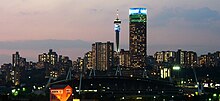Portal:Business
The Business and Economics Portal Business is the practice of making one's living or making money by producing or buying and selling products (such as goods and services). It is also "any activity or enterprise entered into for profit." A business entity is not necessarily separate from the owner and the creditors can hold the owner liable for debts the business has acquired. The taxation system for businesses is different from that of the corporates. A business structure does not allow for corporate tax rates. The proprietor is personally taxed on all income from the business. A distinction is made in law and public offices between the term business and a company such as a corporation or cooperative. Colloquially, the terms are used interchangeably. (Full article...) Economics (/ˌɛkəˈnɒmɪks, ˌiːkə-/) is a social science that studies the production, distribution, and consumption of goods and services. Economics focuses on the behaviour and interactions of economic agents and how economies work. Microeconomics analyses what is viewed as basic elements in the economy, including individual agents and markets, their interactions, and the outcomes of interactions. Individual agents may include, for example, households, firms, buyers, and sellers. Macroeconomics analyses the economy as a system where production, distribution, consumption, savings, and investment expenditure interact, and factors affecting it: factors of production, such as labour, capital, land, and enterprise, inflation, economic growth, and public policies that have impact on these elements. (Full article...) Selected article American International Group, Inc. (AIG) is an American multinational finance and insurance corporation with operations in more than 80 countries and jurisdictions. As of 2023, AIG employed 25,200 people. The company operates through three core businesses: general insurance, life & retirement, and a standalone technology-enabled subsidiary. General Insurance includes Commercial, Personal Insurance, U.S. and International field operations. Life & Retirement includes Group Retirement, Individual Retirement, Life, and Institutional Markets. AIG is the title sponsor of the AIG Women's Open golf tournament. In 2023, for the sixth consecutive year, DiversityInc named AIG among the Top 50 Companies for Diversity list. AIG's corporate headquarters are in New York City and the company also has offices around the world. AIG serves 87% of the Fortune Global 500 and 83% of the Forbes 2000. AIG was ranked 60th on the 2018 Fortune 500 list. According to the 2016 Forbes Global 2000 list, AIG is the 87th largest public company in the world. On December 31, 2017, AIG had $65.2 billion (~$79.7 billion in 2023) in shareholder equity. Selected image
Selected economyThe economy of South Africa is a mixed economy, emerging market, and upper-middle-income economy, one of only eight such countries in Africa. The economy is the most industrialized, technologically advanced, and diversified economy in Africa. Following 1996, at the end of over twelve years of international sanctions, South Africa's nominal gross domestic product (GDP) almost tripled to a peak of US$416 billion in 2011. In the same period, foreign exchange reserves increased from US$3 billion to nearly US$50 billion, creating a diversified economy with a growing and sizable middle class, within two decades of ending apartheid. Although the natural resource extraction industry remains one of the largest in the country with an annual contribution to the GDP of US$13.5 billion, the economy of South Africa has diversified since the end of apartheid, particularly towards services. In 2019, the financial industry contributed US$41.4 billion to South Africa's GDP. In 2021, South Africa-based financial institutions managed more than US$1.41 trillion in assets. The total market capitalization of the Johannesburg Stock Exchange is US$1.28 trillion as of October 2021. (Full article...) Selected quote"The money influence—the pressing to make a profit on an "investment"—and its consequent neglect of skimping of work and hence of service showed itself to me in many ways. It seemed to be at the bottom of most troubles. It was the cause of low wages—for without well-directed work high wages cannot be paid. And if the whole attention is not given to the work it cannot be well directed. Most men want to be free to work; under the system in use they could not be free to work. During my first experience I was not free—I could not give full play to my ideas. Everything had to be planned to make money; the last consideration was the work. And the most curious part of it all was the insistence that it was the money and not the work that counted. It did not seem to strike any one as illogical that money should be put ahead of work—even though everyone had to admit that the profit had to come from the work. The desire seemed to be to find a short cut to money and to pass over the obvious short cut—which is through the work."
TopicsRelated WikiProjectsDid you know (auto-generated) -
On this day in business history
General imagesThe following are images from various business-related articles on Wikipedia.
More did you know
Business news Wikinews Economy and business portal
|
- Portals with triaged subpages from June 2018
- All portals with triaged subpages
- All portals
- Portals with no named maintainer
- Business and economics portal
- Random portal component with over 50 available subpages
- Random portal component with 26–30 available image subpages
- Random portal component with more available subpages than specified max
- Random portal component with 11–15 available subpages
- Society portals
- Business
- Redirect targets of redirected portals with existing subpages






































